Analysis of Fodare Pty Ltd v Shearn [2011] NSWSC 479: Business Law
VerifiedAdded on 2023/06/05
|10
|2718
|389
Report
AI Summary
This report analyzes the case of Fodare Pty Ltd v Shearn [2011] NSWSC 479, focusing on the breach of director duties under the Corporations Act 2001 (Cth). The case involves Ms. Shearn, the director of Fodare Pty Ltd, who misused company assets for personal gain, specifically regarding the sale of the Menangle Park property. The report details the duties of directors as outlined in the Act, including diligence, good faith, and proper use of position and information. It highlights how Ms. Shearn breached these duties by diverting sale proceeds to her personal trust and failing to provide financial records during liquidation proceedings. The court found her liable, ordering equitable compensation and interest. The significance of the decision lies in its impact on director accountability and corporate governance in Australia, emphasizing the importance of acting in the best interest of the company and disclosing potential conflicts of interest. The report concludes by summarizing the key takeaways from the case and its implications for corporate law.
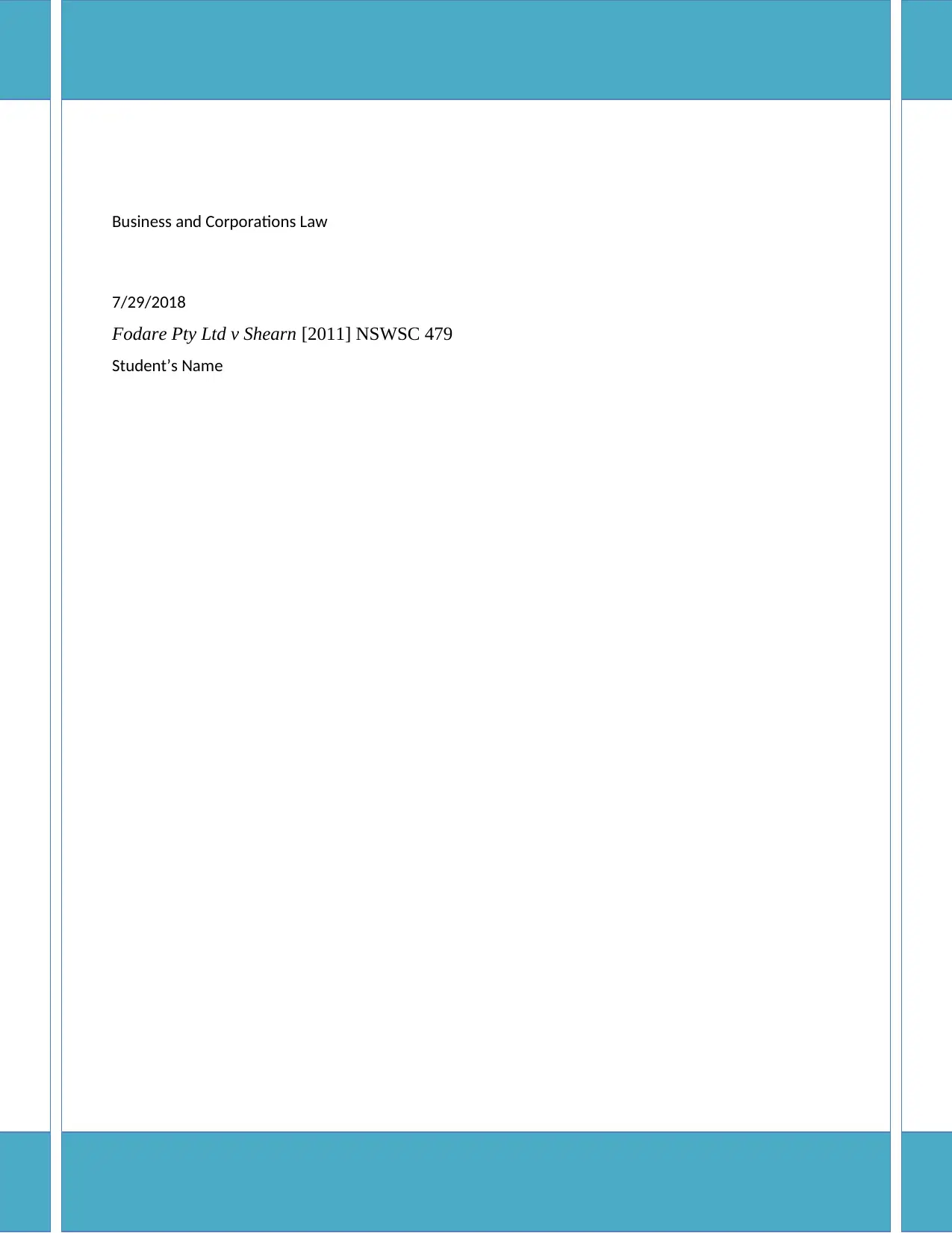
Running Head: BUSINESS AND CORPORATION LAW 0
Business and Corporations Law
7/29/2018
Fodare Pty Ltd v Shearn [2011] NSWSC 479
Student’s Name
Business and Corporations Law
7/29/2018
Fodare Pty Ltd v Shearn [2011] NSWSC 479
Student’s Name
Paraphrase This Document
Need a fresh take? Get an instant paraphrase of this document with our AI Paraphraser
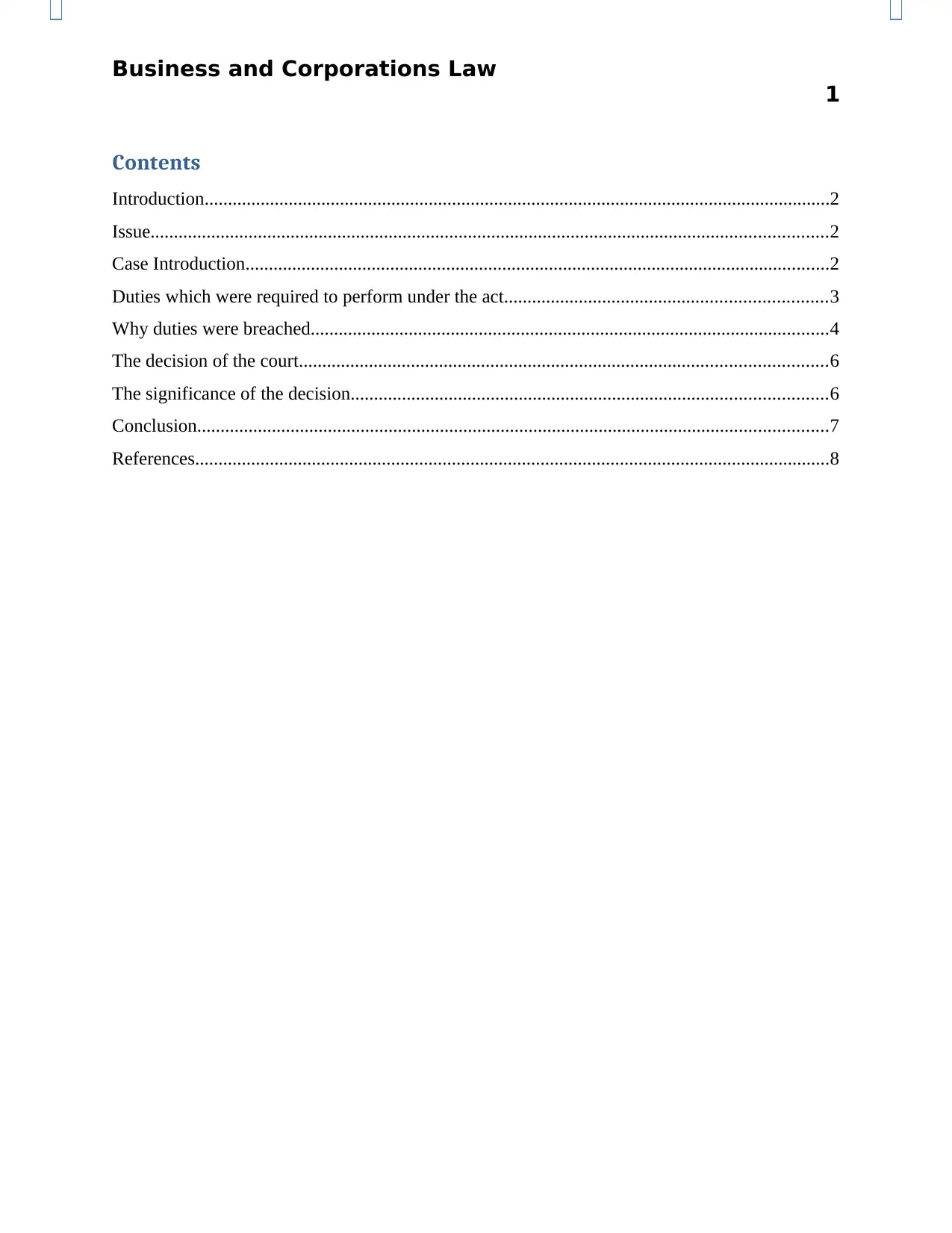
Business and Corporations Law
1
Contents
Introduction......................................................................................................................................2
Issue.................................................................................................................................................2
Case Introduction.............................................................................................................................2
Duties which were required to perform under the act.....................................................................3
Why duties were breached...............................................................................................................4
The decision of the court.................................................................................................................6
The significance of the decision......................................................................................................6
Conclusion.......................................................................................................................................7
References........................................................................................................................................8
1
Contents
Introduction......................................................................................................................................2
Issue.................................................................................................................................................2
Case Introduction.............................................................................................................................2
Duties which were required to perform under the act.....................................................................3
Why duties were breached...............................................................................................................4
The decision of the court.................................................................................................................6
The significance of the decision......................................................................................................6
Conclusion.......................................................................................................................................7
References........................................................................................................................................8
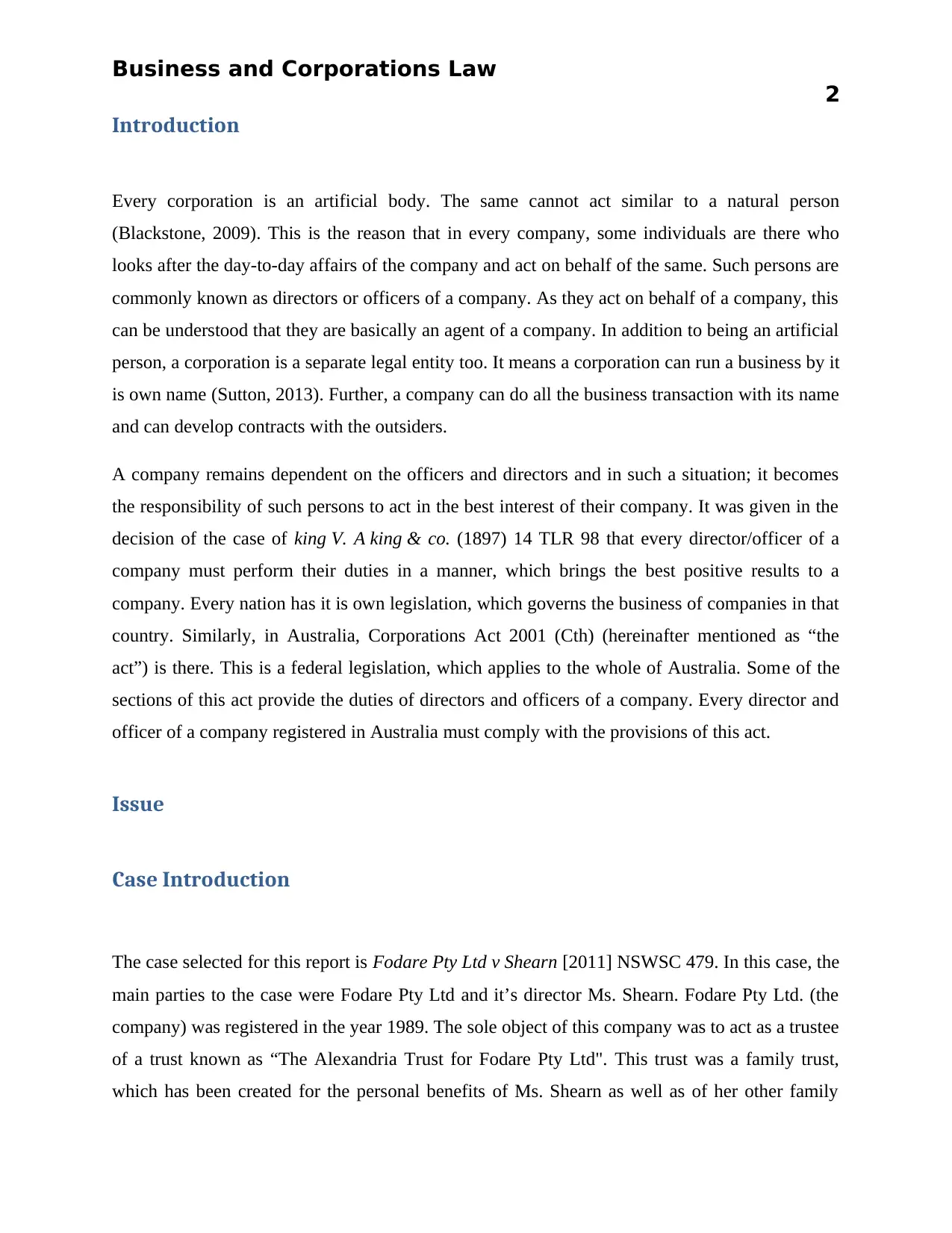
Business and Corporations Law
2
Introduction
Every corporation is an artificial body. The same cannot act similar to a natural person
(Blackstone, 2009). This is the reason that in every company, some individuals are there who
looks after the day-to-day affairs of the company and act on behalf of the same. Such persons are
commonly known as directors or officers of a company. As they act on behalf of a company, this
can be understood that they are basically an agent of a company. In addition to being an artificial
person, a corporation is a separate legal entity too. It means a corporation can run a business by it
is own name (Sutton, 2013). Further, a company can do all the business transaction with its name
and can develop contracts with the outsiders.
A company remains dependent on the officers and directors and in such a situation; it becomes
the responsibility of such persons to act in the best interest of their company. It was given in the
decision of the case of king V. A king & co. (1897) 14 TLR 98 that every director/officer of a
company must perform their duties in a manner, which brings the best positive results to a
company. Every nation has it is own legislation, which governs the business of companies in that
country. Similarly, in Australia, Corporations Act 2001 (Cth) (hereinafter mentioned as “the
act”) is there. This is a federal legislation, which applies to the whole of Australia. Some of the
sections of this act provide the duties of directors and officers of a company. Every director and
officer of a company registered in Australia must comply with the provisions of this act.
Issue
Case Introduction
The case selected for this report is Fodare Pty Ltd v Shearn [2011] NSWSC 479. In this case, the
main parties to the case were Fodare Pty Ltd and it’s director Ms. Shearn. Fodare Pty Ltd. (the
company) was registered in the year 1989. The sole object of this company was to act as a trustee
of a trust known as “The Alexandria Trust for Fodare Pty Ltd". This trust was a family trust,
which has been created for the personal benefits of Ms. Shearn as well as of her other family
2
Introduction
Every corporation is an artificial body. The same cannot act similar to a natural person
(Blackstone, 2009). This is the reason that in every company, some individuals are there who
looks after the day-to-day affairs of the company and act on behalf of the same. Such persons are
commonly known as directors or officers of a company. As they act on behalf of a company, this
can be understood that they are basically an agent of a company. In addition to being an artificial
person, a corporation is a separate legal entity too. It means a corporation can run a business by it
is own name (Sutton, 2013). Further, a company can do all the business transaction with its name
and can develop contracts with the outsiders.
A company remains dependent on the officers and directors and in such a situation; it becomes
the responsibility of such persons to act in the best interest of their company. It was given in the
decision of the case of king V. A king & co. (1897) 14 TLR 98 that every director/officer of a
company must perform their duties in a manner, which brings the best positive results to a
company. Every nation has it is own legislation, which governs the business of companies in that
country. Similarly, in Australia, Corporations Act 2001 (Cth) (hereinafter mentioned as “the
act”) is there. This is a federal legislation, which applies to the whole of Australia. Some of the
sections of this act provide the duties of directors and officers of a company. Every director and
officer of a company registered in Australia must comply with the provisions of this act.
Issue
Case Introduction
The case selected for this report is Fodare Pty Ltd v Shearn [2011] NSWSC 479. In this case, the
main parties to the case were Fodare Pty Ltd and it’s director Ms. Shearn. Fodare Pty Ltd. (the
company) was registered in the year 1989. The sole object of this company was to act as a trustee
of a trust known as “The Alexandria Trust for Fodare Pty Ltd". This trust was a family trust,
which has been created for the personal benefits of Ms. Shearn as well as of her other family
⊘ This is a preview!⊘
Do you want full access?
Subscribe today to unlock all pages.

Trusted by 1+ million students worldwide
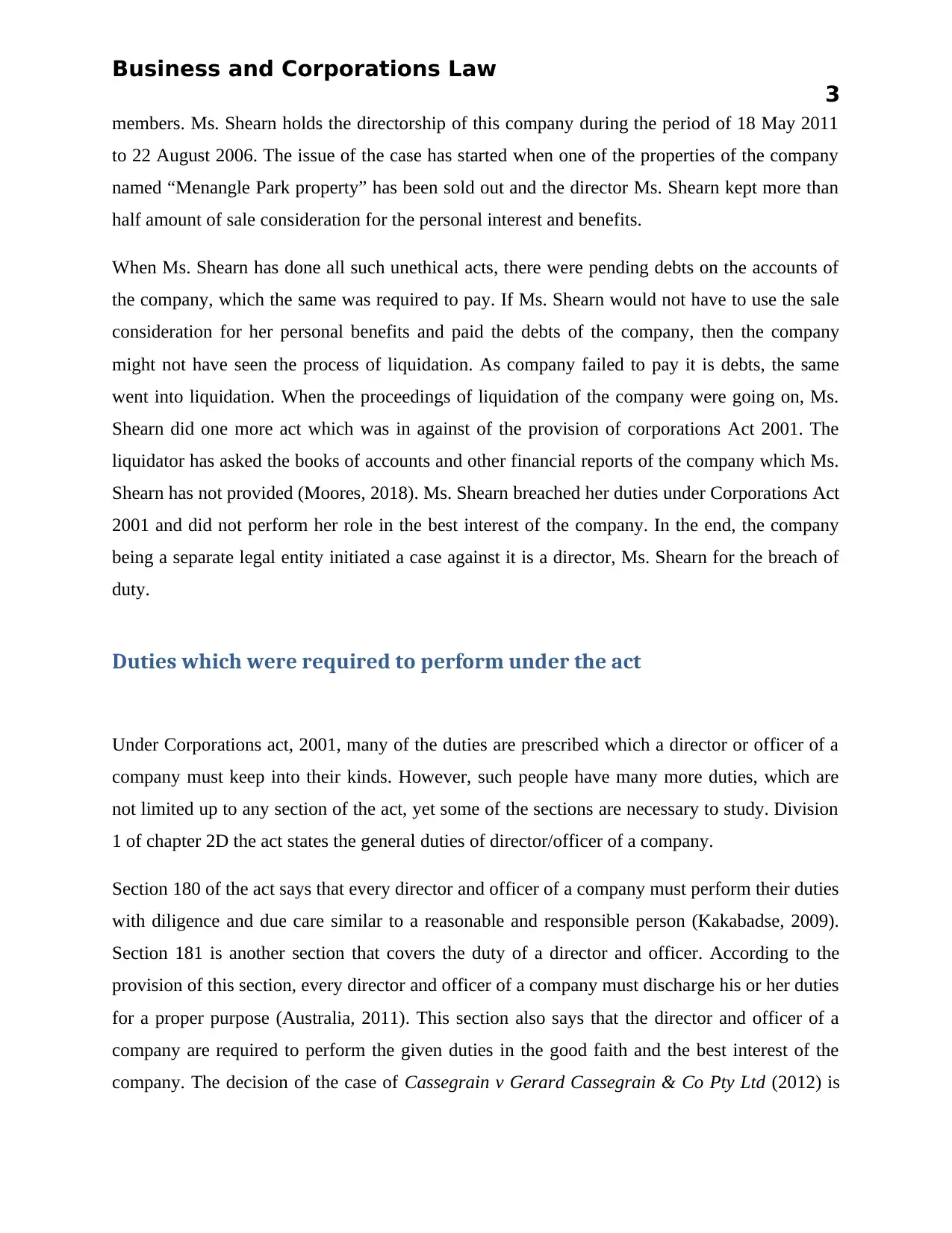
Business and Corporations Law
3
members. Ms. Shearn holds the directorship of this company during the period of 18 May 2011
to 22 August 2006. The issue of the case has started when one of the properties of the company
named “Menangle Park property” has been sold out and the director Ms. Shearn kept more than
half amount of sale consideration for the personal interest and benefits.
When Ms. Shearn has done all such unethical acts, there were pending debts on the accounts of
the company, which the same was required to pay. If Ms. Shearn would not have to use the sale
consideration for her personal benefits and paid the debts of the company, then the company
might not have seen the process of liquidation. As company failed to pay it is debts, the same
went into liquidation. When the proceedings of liquidation of the company were going on, Ms.
Shearn did one more act which was in against of the provision of corporations Act 2001. The
liquidator has asked the books of accounts and other financial reports of the company which Ms.
Shearn has not provided (Moores, 2018). Ms. Shearn breached her duties under Corporations Act
2001 and did not perform her role in the best interest of the company. In the end, the company
being a separate legal entity initiated a case against it is a director, Ms. Shearn for the breach of
duty.
Duties which were required to perform under the act
Under Corporations act, 2001, many of the duties are prescribed which a director or officer of a
company must keep into their kinds. However, such people have many more duties, which are
not limited up to any section of the act, yet some of the sections are necessary to study. Division
1 of chapter 2D the act states the general duties of director/officer of a company.
Section 180 of the act says that every director and officer of a company must perform their duties
with diligence and due care similar to a reasonable and responsible person (Kakabadse, 2009).
Section 181 is another section that covers the duty of a director and officer. According to the
provision of this section, every director and officer of a company must discharge his or her duties
for a proper purpose (Australia, 2011). This section also says that the director and officer of a
company are required to perform the given duties in the good faith and the best interest of the
company. The decision of the case of Cassegrain v Gerard Cassegrain & Co Pty Ltd (2012) is
3
members. Ms. Shearn holds the directorship of this company during the period of 18 May 2011
to 22 August 2006. The issue of the case has started when one of the properties of the company
named “Menangle Park property” has been sold out and the director Ms. Shearn kept more than
half amount of sale consideration for the personal interest and benefits.
When Ms. Shearn has done all such unethical acts, there were pending debts on the accounts of
the company, which the same was required to pay. If Ms. Shearn would not have to use the sale
consideration for her personal benefits and paid the debts of the company, then the company
might not have seen the process of liquidation. As company failed to pay it is debts, the same
went into liquidation. When the proceedings of liquidation of the company were going on, Ms.
Shearn did one more act which was in against of the provision of corporations Act 2001. The
liquidator has asked the books of accounts and other financial reports of the company which Ms.
Shearn has not provided (Moores, 2018). Ms. Shearn breached her duties under Corporations Act
2001 and did not perform her role in the best interest of the company. In the end, the company
being a separate legal entity initiated a case against it is a director, Ms. Shearn for the breach of
duty.
Duties which were required to perform under the act
Under Corporations act, 2001, many of the duties are prescribed which a director or officer of a
company must keep into their kinds. However, such people have many more duties, which are
not limited up to any section of the act, yet some of the sections are necessary to study. Division
1 of chapter 2D the act states the general duties of director/officer of a company.
Section 180 of the act says that every director and officer of a company must perform their duties
with diligence and due care similar to a reasonable and responsible person (Kakabadse, 2009).
Section 181 is another section that covers the duty of a director and officer. According to the
provision of this section, every director and officer of a company must discharge his or her duties
for a proper purpose (Australia, 2011). This section also says that the director and officer of a
company are required to perform the given duties in the good faith and the best interest of the
company. The decision of the case of Cassegrain v Gerard Cassegrain & Co Pty Ltd (2012) is
Paraphrase This Document
Need a fresh take? Get an instant paraphrase of this document with our AI Paraphraser
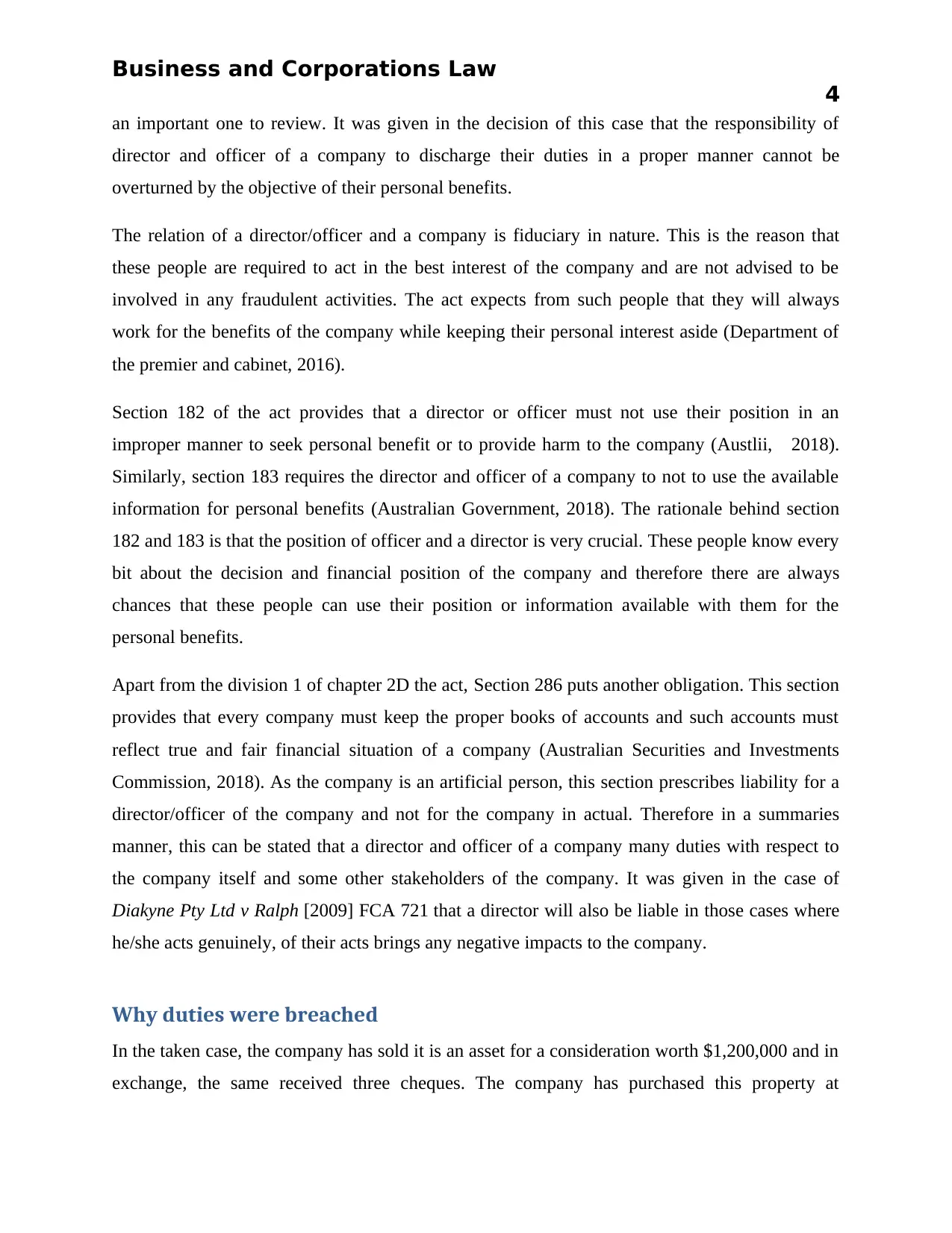
Business and Corporations Law
4
an important one to review. It was given in the decision of this case that the responsibility of
director and officer of a company to discharge their duties in a proper manner cannot be
overturned by the objective of their personal benefits.
The relation of a director/officer and a company is fiduciary in nature. This is the reason that
these people are required to act in the best interest of the company and are not advised to be
involved in any fraudulent activities. The act expects from such people that they will always
work for the benefits of the company while keeping their personal interest aside (Department of
the premier and cabinet, 2016).
Section 182 of the act provides that a director or officer must not use their position in an
improper manner to seek personal benefit or to provide harm to the company (Austlii, 2018).
Similarly, section 183 requires the director and officer of a company to not to use the available
information for personal benefits (Australian Government, 2018). The rationale behind section
182 and 183 is that the position of officer and a director is very crucial. These people know every
bit about the decision and financial position of the company and therefore there are always
chances that these people can use their position or information available with them for the
personal benefits.
Apart from the division 1 of chapter 2D the act, Section 286 puts another obligation. This section
provides that every company must keep the proper books of accounts and such accounts must
reflect true and fair financial situation of a company (Australian Securities and Investments
Commission, 2018). As the company is an artificial person, this section prescribes liability for a
director/officer of the company and not for the company in actual. Therefore in a summaries
manner, this can be stated that a director and officer of a company many duties with respect to
the company itself and some other stakeholders of the company. It was given in the case of
Diakyne Pty Ltd v Ralph [2009] FCA 721 that a director will also be liable in those cases where
he/she acts genuinely, of their acts brings any negative impacts to the company.
Why duties were breached
In the taken case, the company has sold it is an asset for a consideration worth $1,200,000 and in
exchange, the same received three cheques. The company has purchased this property at
4
an important one to review. It was given in the decision of this case that the responsibility of
director and officer of a company to discharge their duties in a proper manner cannot be
overturned by the objective of their personal benefits.
The relation of a director/officer and a company is fiduciary in nature. This is the reason that
these people are required to act in the best interest of the company and are not advised to be
involved in any fraudulent activities. The act expects from such people that they will always
work for the benefits of the company while keeping their personal interest aside (Department of
the premier and cabinet, 2016).
Section 182 of the act provides that a director or officer must not use their position in an
improper manner to seek personal benefit or to provide harm to the company (Austlii, 2018).
Similarly, section 183 requires the director and officer of a company to not to use the available
information for personal benefits (Australian Government, 2018). The rationale behind section
182 and 183 is that the position of officer and a director is very crucial. These people know every
bit about the decision and financial position of the company and therefore there are always
chances that these people can use their position or information available with them for the
personal benefits.
Apart from the division 1 of chapter 2D the act, Section 286 puts another obligation. This section
provides that every company must keep the proper books of accounts and such accounts must
reflect true and fair financial situation of a company (Australian Securities and Investments
Commission, 2018). As the company is an artificial person, this section prescribes liability for a
director/officer of the company and not for the company in actual. Therefore in a summaries
manner, this can be stated that a director and officer of a company many duties with respect to
the company itself and some other stakeholders of the company. It was given in the case of
Diakyne Pty Ltd v Ralph [2009] FCA 721 that a director will also be liable in those cases where
he/she acts genuinely, of their acts brings any negative impacts to the company.
Why duties were breached
In the taken case, the company has sold it is an asset for a consideration worth $1,200,000 and in
exchange, the same received three cheques. The company has purchased this property at
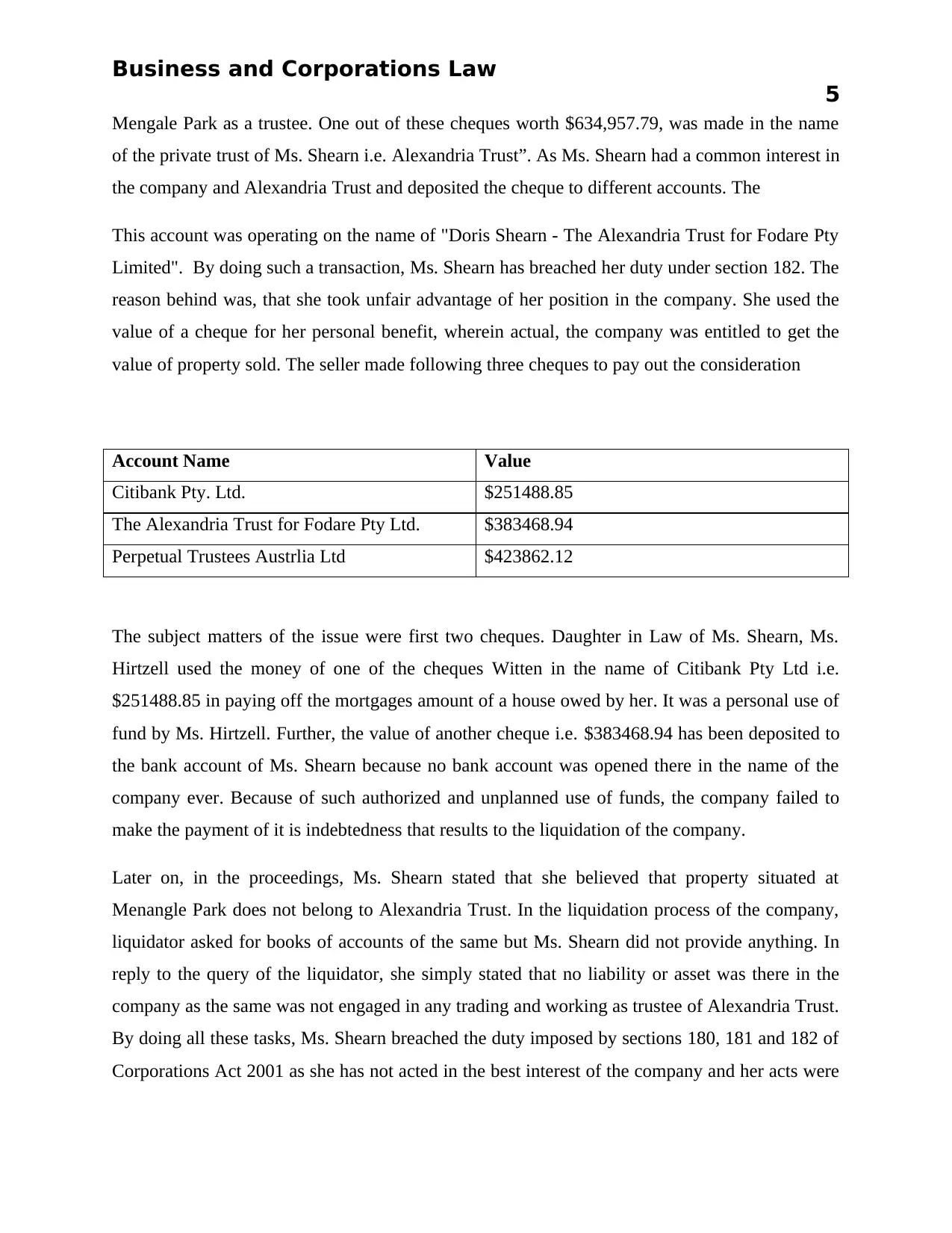
Business and Corporations Law
5
Mengale Park as a trustee. One out of these cheques worth $634,957.79, was made in the name
of the private trust of Ms. Shearn i.e. Alexandria Trust”. As Ms. Shearn had a common interest in
the company and Alexandria Trust and deposited the cheque to different accounts. The
This account was operating on the name of "Doris Shearn - The Alexandria Trust for Fodare Pty
Limited". By doing such a transaction, Ms. Shearn has breached her duty under section 182. The
reason behind was, that she took unfair advantage of her position in the company. She used the
value of a cheque for her personal benefit, wherein actual, the company was entitled to get the
value of property sold. The seller made following three cheques to pay out the consideration
Account Name Value
Citibank Pty. Ltd. $251488.85
The Alexandria Trust for Fodare Pty Ltd. $383468.94
Perpetual Trustees Austrlia Ltd $423862.12
The subject matters of the issue were first two cheques. Daughter in Law of Ms. Shearn, Ms.
Hirtzell used the money of one of the cheques Witten in the name of Citibank Pty Ltd i.e.
$251488.85 in paying off the mortgages amount of a house owed by her. It was a personal use of
fund by Ms. Hirtzell. Further, the value of another cheque i.e. $383468.94 has been deposited to
the bank account of Ms. Shearn because no bank account was opened there in the name of the
company ever. Because of such authorized and unplanned use of funds, the company failed to
make the payment of it is indebtedness that results to the liquidation of the company.
Later on, in the proceedings, Ms. Shearn stated that she believed that property situated at
Menangle Park does not belong to Alexandria Trust. In the liquidation process of the company,
liquidator asked for books of accounts of the same but Ms. Shearn did not provide anything. In
reply to the query of the liquidator, she simply stated that no liability or asset was there in the
company as the same was not engaged in any trading and working as trustee of Alexandria Trust.
By doing all these tasks, Ms. Shearn breached the duty imposed by sections 180, 181 and 182 of
Corporations Act 2001 as she has not acted in the best interest of the company and her acts were
5
Mengale Park as a trustee. One out of these cheques worth $634,957.79, was made in the name
of the private trust of Ms. Shearn i.e. Alexandria Trust”. As Ms. Shearn had a common interest in
the company and Alexandria Trust and deposited the cheque to different accounts. The
This account was operating on the name of "Doris Shearn - The Alexandria Trust for Fodare Pty
Limited". By doing such a transaction, Ms. Shearn has breached her duty under section 182. The
reason behind was, that she took unfair advantage of her position in the company. She used the
value of a cheque for her personal benefit, wherein actual, the company was entitled to get the
value of property sold. The seller made following three cheques to pay out the consideration
Account Name Value
Citibank Pty. Ltd. $251488.85
The Alexandria Trust for Fodare Pty Ltd. $383468.94
Perpetual Trustees Austrlia Ltd $423862.12
The subject matters of the issue were first two cheques. Daughter in Law of Ms. Shearn, Ms.
Hirtzell used the money of one of the cheques Witten in the name of Citibank Pty Ltd i.e.
$251488.85 in paying off the mortgages amount of a house owed by her. It was a personal use of
fund by Ms. Hirtzell. Further, the value of another cheque i.e. $383468.94 has been deposited to
the bank account of Ms. Shearn because no bank account was opened there in the name of the
company ever. Because of such authorized and unplanned use of funds, the company failed to
make the payment of it is indebtedness that results to the liquidation of the company.
Later on, in the proceedings, Ms. Shearn stated that she believed that property situated at
Menangle Park does not belong to Alexandria Trust. In the liquidation process of the company,
liquidator asked for books of accounts of the same but Ms. Shearn did not provide anything. In
reply to the query of the liquidator, she simply stated that no liability or asset was there in the
company as the same was not engaged in any trading and working as trustee of Alexandria Trust.
By doing all these tasks, Ms. Shearn breached the duty imposed by sections 180, 181 and 182 of
Corporations Act 2001 as she has not acted in the best interest of the company and her acts were
⊘ This is a preview!⊘
Do you want full access?
Subscribe today to unlock all pages.

Trusted by 1+ million students worldwide
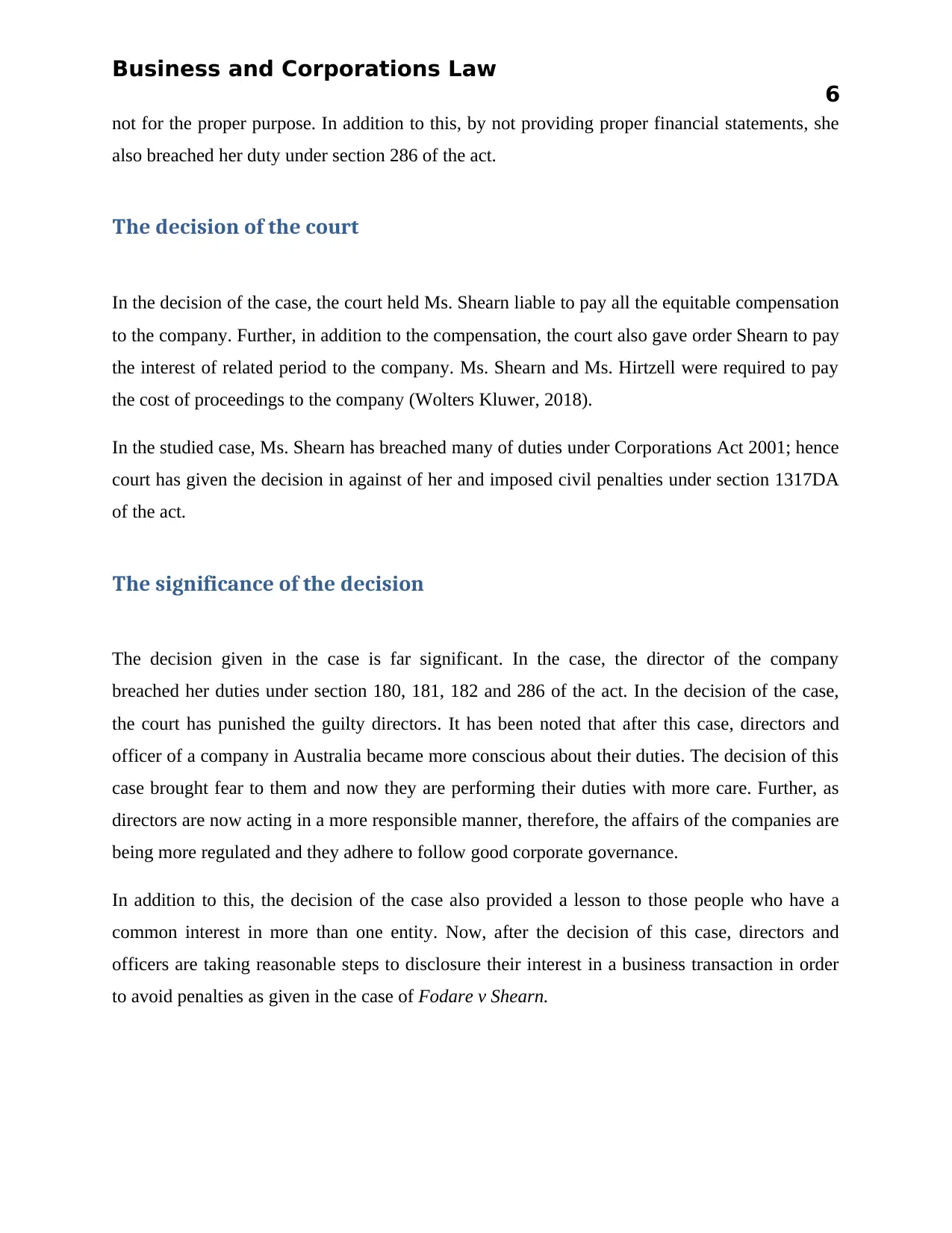
Business and Corporations Law
6
not for the proper purpose. In addition to this, by not providing proper financial statements, she
also breached her duty under section 286 of the act.
The decision of the court
In the decision of the case, the court held Ms. Shearn liable to pay all the equitable compensation
to the company. Further, in addition to the compensation, the court also gave order Shearn to pay
the interest of related period to the company. Ms. Shearn and Ms. Hirtzell were required to pay
the cost of proceedings to the company (Wolters Kluwer, 2018).
In the studied case, Ms. Shearn has breached many of duties under Corporations Act 2001; hence
court has given the decision in against of her and imposed civil penalties under section 1317DA
of the act.
The significance of the decision
The decision given in the case is far significant. In the case, the director of the company
breached her duties under section 180, 181, 182 and 286 of the act. In the decision of the case,
the court has punished the guilty directors. It has been noted that after this case, directors and
officer of a company in Australia became more conscious about their duties. The decision of this
case brought fear to them and now they are performing their duties with more care. Further, as
directors are now acting in a more responsible manner, therefore, the affairs of the companies are
being more regulated and they adhere to follow good corporate governance.
In addition to this, the decision of the case also provided a lesson to those people who have a
common interest in more than one entity. Now, after the decision of this case, directors and
officers are taking reasonable steps to disclosure their interest in a business transaction in order
to avoid penalties as given in the case of Fodare v Shearn.
6
not for the proper purpose. In addition to this, by not providing proper financial statements, she
also breached her duty under section 286 of the act.
The decision of the court
In the decision of the case, the court held Ms. Shearn liable to pay all the equitable compensation
to the company. Further, in addition to the compensation, the court also gave order Shearn to pay
the interest of related period to the company. Ms. Shearn and Ms. Hirtzell were required to pay
the cost of proceedings to the company (Wolters Kluwer, 2018).
In the studied case, Ms. Shearn has breached many of duties under Corporations Act 2001; hence
court has given the decision in against of her and imposed civil penalties under section 1317DA
of the act.
The significance of the decision
The decision given in the case is far significant. In the case, the director of the company
breached her duties under section 180, 181, 182 and 286 of the act. In the decision of the case,
the court has punished the guilty directors. It has been noted that after this case, directors and
officer of a company in Australia became more conscious about their duties. The decision of this
case brought fear to them and now they are performing their duties with more care. Further, as
directors are now acting in a more responsible manner, therefore, the affairs of the companies are
being more regulated and they adhere to follow good corporate governance.
In addition to this, the decision of the case also provided a lesson to those people who have a
common interest in more than one entity. Now, after the decision of this case, directors and
officers are taking reasonable steps to disclosure their interest in a business transaction in order
to avoid penalties as given in the case of Fodare v Shearn.
Paraphrase This Document
Need a fresh take? Get an instant paraphrase of this document with our AI Paraphraser
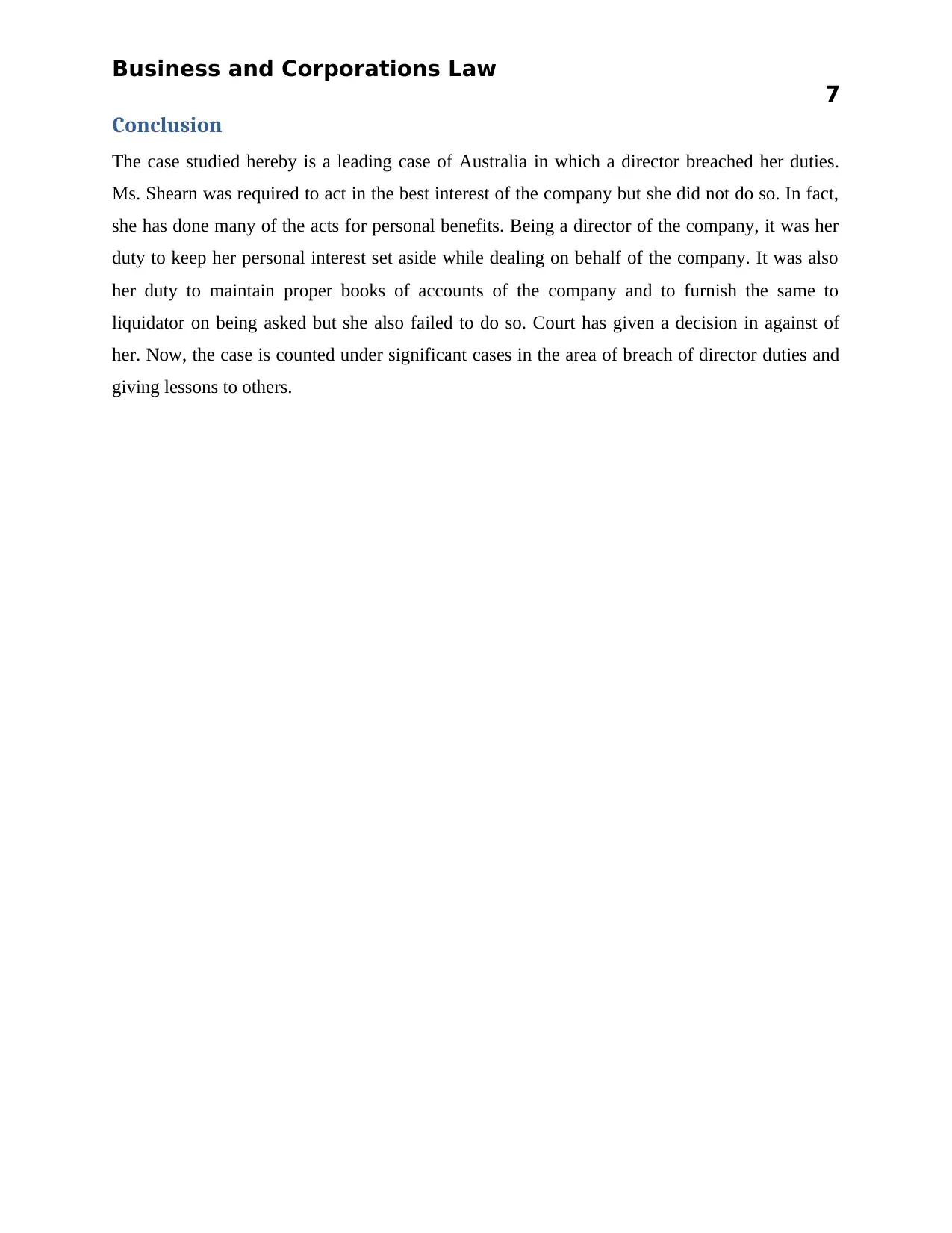
Business and Corporations Law
7
Conclusion
The case studied hereby is a leading case of Australia in which a director breached her duties.
Ms. Shearn was required to act in the best interest of the company but she did not do so. In fact,
she has done many of the acts for personal benefits. Being a director of the company, it was her
duty to keep her personal interest set aside while dealing on behalf of the company. It was also
her duty to maintain proper books of accounts of the company and to furnish the same to
liquidator on being asked but she also failed to do so. Court has given a decision in against of
her. Now, the case is counted under significant cases in the area of breach of director duties and
giving lessons to others.
7
Conclusion
The case studied hereby is a leading case of Australia in which a director breached her duties.
Ms. Shearn was required to act in the best interest of the company but she did not do so. In fact,
she has done many of the acts for personal benefits. Being a director of the company, it was her
duty to keep her personal interest set aside while dealing on behalf of the company. It was also
her duty to maintain proper books of accounts of the company and to furnish the same to
liquidator on being asked but she also failed to do so. Court has given a decision in against of
her. Now, the case is counted under significant cases in the area of breach of director duties and
giving lessons to others.
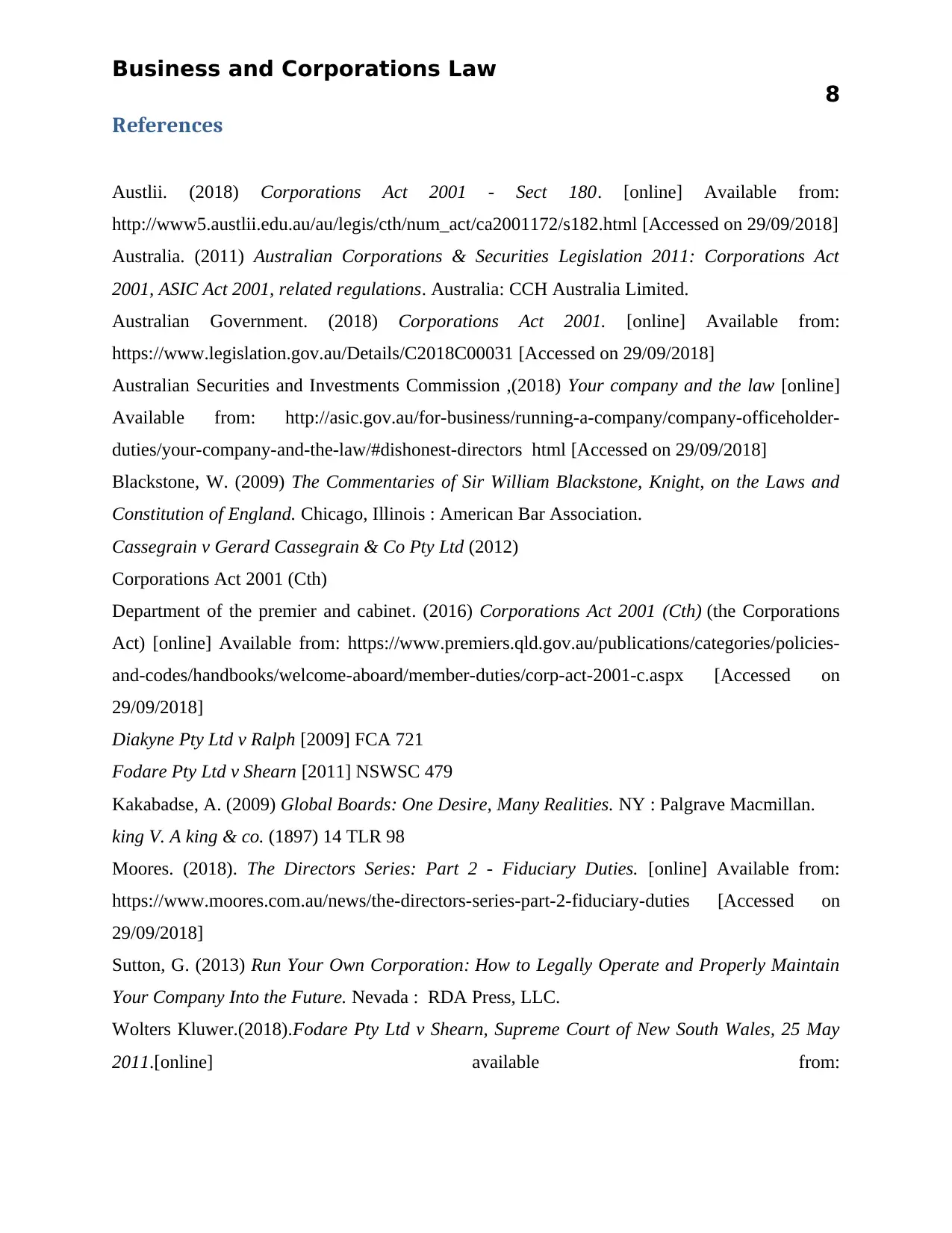
Business and Corporations Law
8
References
Austlii. (2018) Corporations Act 2001 - Sect 180. [online] Available from:
http://www5.austlii.edu.au/au/legis/cth/num_act/ca2001172/s182.html [Accessed on 29/09/2018]
Australia. (2011) Australian Corporations & Securities Legislation 2011: Corporations Act
2001, ASIC Act 2001, related regulations. Australia: CCH Australia Limited.
Australian Government. (2018) Corporations Act 2001. [online] Available from:
https://www.legislation.gov.au/Details/C2018C00031 [Accessed on 29/09/2018]
Australian Securities and Investments Commission ,(2018) Your company and the law [online]
Available from: http://asic.gov.au/for-business/running-a-company/company-officeholder-
duties/your-company-and-the-law/#dishonest-directors html [Accessed on 29/09/2018]
Blackstone, W. (2009) The Commentaries of Sir William Blackstone, Knight, on the Laws and
Constitution of England. Chicago, Illinois : American Bar Association.
Cassegrain v Gerard Cassegrain & Co Pty Ltd (2012)
Corporations Act 2001 (Cth)
Department of the premier and cabinet. (2016) Corporations Act 2001 (Cth) (the Corporations
Act) [online] Available from: https://www.premiers.qld.gov.au/publications/categories/policies-
and-codes/handbooks/welcome-aboard/member-duties/corp-act-2001-c.aspx [Accessed on
29/09/2018]
Diakyne Pty Ltd v Ralph [2009] FCA 721
Fodare Pty Ltd v Shearn [2011] NSWSC 479
Kakabadse, A. (2009) Global Boards: One Desire, Many Realities. NY : Palgrave Macmillan.
king V. A king & co. (1897) 14 TLR 98
Moores. (2018). The Directors Series: Part 2 - Fiduciary Duties. [online] Available from:
https://www.moores.com.au/news/the-directors-series-part-2-fiduciary-duties [Accessed on
29/09/2018]
Sutton, G. (2013) Run Your Own Corporation: How to Legally Operate and Properly Maintain
Your Company Into the Future. Nevada : RDA Press, LLC.
Wolters Kluwer.(2018).Fodare Pty Ltd v Shearn, Supreme Court of New South Wales, 25 May
2011.[online] available from:
8
References
Austlii. (2018) Corporations Act 2001 - Sect 180. [online] Available from:
http://www5.austlii.edu.au/au/legis/cth/num_act/ca2001172/s182.html [Accessed on 29/09/2018]
Australia. (2011) Australian Corporations & Securities Legislation 2011: Corporations Act
2001, ASIC Act 2001, related regulations. Australia: CCH Australia Limited.
Australian Government. (2018) Corporations Act 2001. [online] Available from:
https://www.legislation.gov.au/Details/C2018C00031 [Accessed on 29/09/2018]
Australian Securities and Investments Commission ,(2018) Your company and the law [online]
Available from: http://asic.gov.au/for-business/running-a-company/company-officeholder-
duties/your-company-and-the-law/#dishonest-directors html [Accessed on 29/09/2018]
Blackstone, W. (2009) The Commentaries of Sir William Blackstone, Knight, on the Laws and
Constitution of England. Chicago, Illinois : American Bar Association.
Cassegrain v Gerard Cassegrain & Co Pty Ltd (2012)
Corporations Act 2001 (Cth)
Department of the premier and cabinet. (2016) Corporations Act 2001 (Cth) (the Corporations
Act) [online] Available from: https://www.premiers.qld.gov.au/publications/categories/policies-
and-codes/handbooks/welcome-aboard/member-duties/corp-act-2001-c.aspx [Accessed on
29/09/2018]
Diakyne Pty Ltd v Ralph [2009] FCA 721
Fodare Pty Ltd v Shearn [2011] NSWSC 479
Kakabadse, A. (2009) Global Boards: One Desire, Many Realities. NY : Palgrave Macmillan.
king V. A king & co. (1897) 14 TLR 98
Moores. (2018). The Directors Series: Part 2 - Fiduciary Duties. [online] Available from:
https://www.moores.com.au/news/the-directors-series-part-2-fiduciary-duties [Accessed on
29/09/2018]
Sutton, G. (2013) Run Your Own Corporation: How to Legally Operate and Properly Maintain
Your Company Into the Future. Nevada : RDA Press, LLC.
Wolters Kluwer.(2018).Fodare Pty Ltd v Shearn, Supreme Court of New South Wales, 25 May
2011.[online] available from:
⊘ This is a preview!⊘
Do you want full access?
Subscribe today to unlock all pages.

Trusted by 1+ million students worldwide
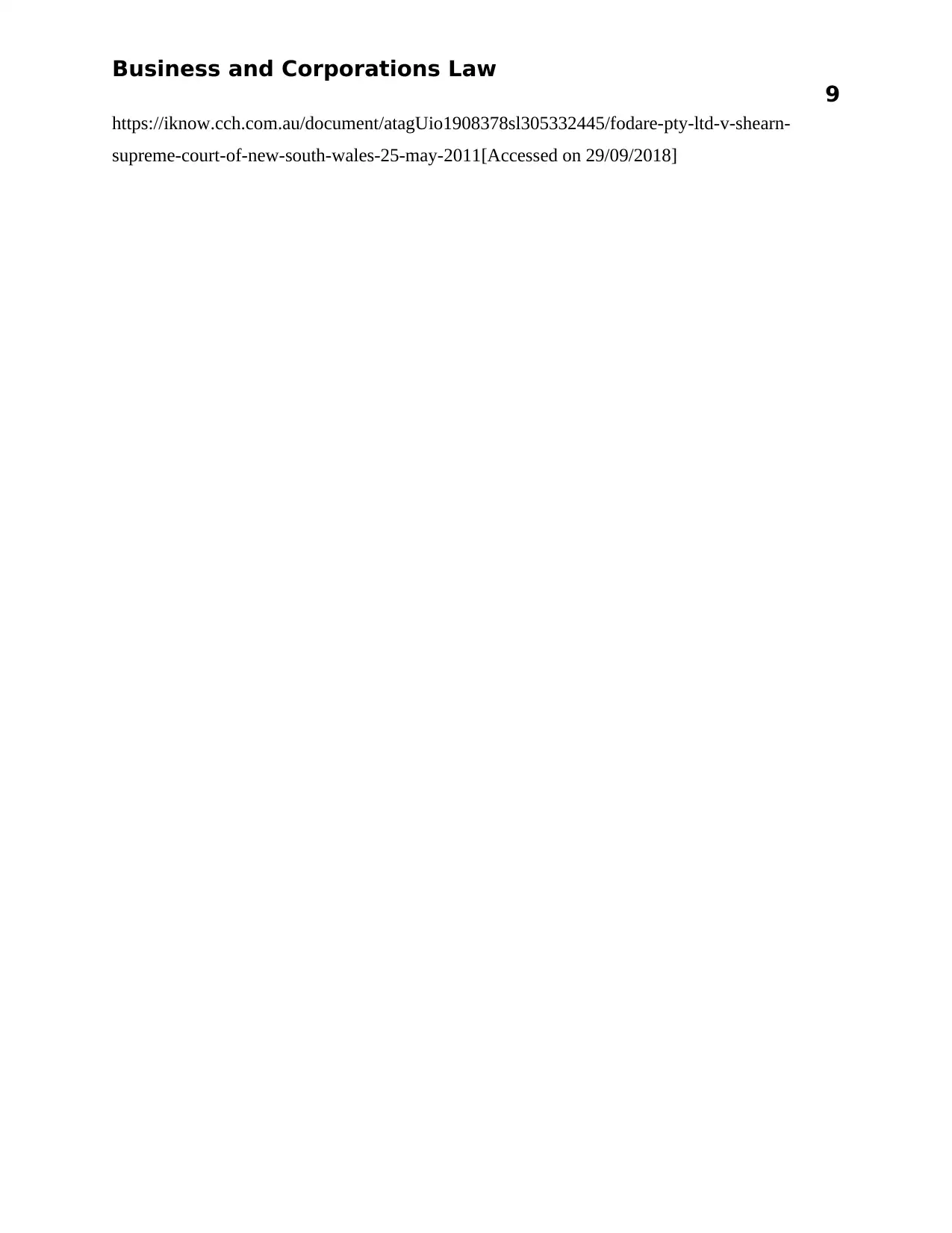
Business and Corporations Law
9
https://iknow.cch.com.au/document/atagUio1908378sl305332445/fodare-pty-ltd-v-shearn-
supreme-court-of-new-south-wales-25-may-2011[Accessed on 29/09/2018]
9
https://iknow.cch.com.au/document/atagUio1908378sl305332445/fodare-pty-ltd-v-shearn-
supreme-court-of-new-south-wales-25-may-2011[Accessed on 29/09/2018]
1 out of 10
Related Documents
Your All-in-One AI-Powered Toolkit for Academic Success.
+13062052269
info@desklib.com
Available 24*7 on WhatsApp / Email
![[object Object]](/_next/static/media/star-bottom.7253800d.svg)
Unlock your academic potential
Copyright © 2020–2026 A2Z Services. All Rights Reserved. Developed and managed by ZUCOL.


![Fodare Pty Ltd v Shearn [2011] NSWSC 479: Director Duty Case Analysis](/_next/image/?url=https%3A%2F%2Fdesklib.com%2Fmedia%2Fimages%2Fmf%2Fb24438803f71439b897a53a3204582ca.jpg&w=256&q=75)
![Fodare Pty Ltd v Shearn [2011] NSWSC 479: Director Duties Case Study](/_next/image/?url=https%3A%2F%2Fdesklib.com%2Fmedia%2Fimages%2Fbz%2Fe5781427ac544a2fa81db59f3d03f924.jpg&w=256&q=75)

![Analysis of Fodare Pyt Ltd. V Shearn [2011] NSWSC 479 Case](/_next/image/?url=https%3A%2F%2Fdesklib.com%2Fmedia%2Fimages%2Fto%2Fc003c47972d54ac499b6fca5329d3bb6.jpg&w=256&q=75)